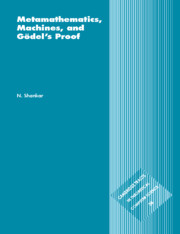1 - Introduction
Published online by Cambridge University Press: 16 October 2009
Summary
Checking mathematical proofs is potentially one of the most interesting and useful applications of automatic computers
John McCarthy [McC62]Very few mathematical statements can be judged to be true or false solely by means of direct observation. Some statements, the axioms, have to be accepted as true without too much further argument. Other statements, the theorems, are believed because they are seen as logical consequences of the axioms by means of a proof. Proofs constitute the only effective mechanism for revealing truth in mathematics. We would naturally hope that all provable statements are indeed true. Most of us would also optimistically believe that any true statement has a proof, but such is not the case. Gödel showed that for any reasonably powerful formal system of axioms and inference rules, there are statements that can neither be proved nor disproved on the basis of the axioms and inference rules, and are therefore undecidable. Gödel also showed that for such formal systems, there could be no absolute proof that all provable statements were in fact true. In his proof, Gödel described a machine that could check if a given construction constituted a valid proof. It was hoped that one could similarly define a machine to discover the proof itself, but Church and Turing showed that such a machine could not exist. We show in this book that a machine, the Boyer–Moore theorem prover, can be used to check Gödel's proof of the existence of undecidable sentences.
Information
- Type
- Chapter
- Information
- Metamathematics, Machines and Gödel's Proof , pp. 1 - 34Publisher: Cambridge University PressPrint publication year: 1994
